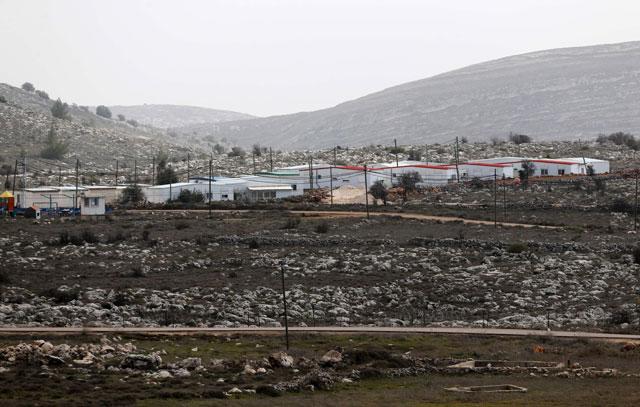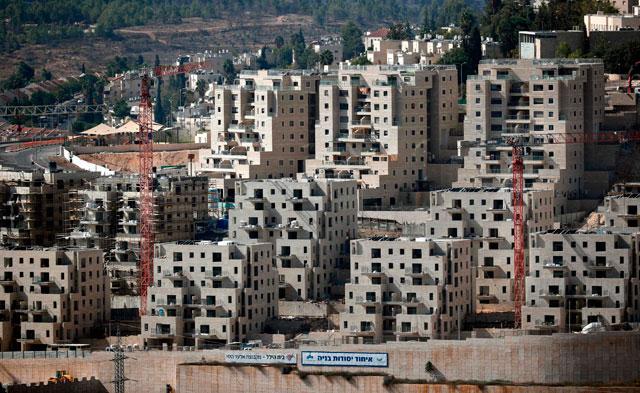You are here
Netanyahu to test Trump policy at Washington talks
By AFP - Feb 13,2017 - Last updated at Feb 13,2017

A photo taken on Thursday shows prefabricated homes near the Israeli settlement unit of Ofra, north of Ramallah in the occupied West Bank (AFP photo)
OCCUPIED JERUSALEM — Israeli Prime Minister Benjamin Netanyahu, who warmly welcomed Donald Trump's election as US president, will visit the White House Wednesday to test his supportive campaign pledges against emerging policy.
Since taking office, Trump has edged away from unqualified backing for Netanyahu's drive for more Jewish settlement in territory the Palestinians claim for a state, and also from a pledge to move the American embassy from Tel Aviv to Jerusalem.
But Netanyahu remained upbeat as he prepared to fly out from Tel Aviv airport on Monday.
"The alliance between Israel and America has always been extremely strong. It's about to get even stronger," the prime minister said.
"President Trump and I see eye to eye on the dangers emanating from the region but also on the opportunities."
Mark Heller, a political scientist at the Institute for National Security Studies (INSS) in Tel Aviv, said the embassy issue was "marginal, to the extent that such a promise is unlikely to be kept".
The prospect of a Trump rethink challenges the hopes of the settler lobby, a driving force in Netanyahu's right-wing coalition government, and others on the Israeli right who want to see at least partial annexation of the West Bank.
In an interview published on Friday in the pro-Netanyahu daily Israel Hayom, Trump said settlement growth was not "good for peace".
Netanyahu has announced more than 5,000 settlement units since Trump's January 20 inauguration, as well as the first new settlement for more than 20 years.
Room to manoeuvre?
Around 600,000 Israelis currently live in settlements in the occupied West Bank and East Jerusalem, communities considered illegal by the United Nations and most world powers.
"In Washington, Benjamin Netanyahu will test his room to manoeuvre [with Trump] on settlements," Heller told AFP.
"For [the past] three weeks Donald Trump has been speaking differently," said Michael Oren, deputy minister in charge of diplomacy in Netanyahu's office. "We must act cautiously."
Netanyahu himself said at Sunday's weekly Cabinet meeting that strengthening Israel's ties with its historic ally "requires a responsible and considered policy, and that is how I intend to act".
"I have navigated Israeli-US relations in a prudent manner and I will continue to do so now," he told ministers and media.
His comments may have been aimed at education minister and staunch settlement backer Naftali Bennett, of the far-right Jewish Home Party.
On Sunday, Bennett urged Netanyahu "not to miss an historic opportunity" provided by Trump's election and to drop his declared support for a two-state solution to the Israeli-Palestinian conflict.
"Netanyahu, please make it clear to Trump in our name: There will not be a Palestinian state in the heart of our land," he wrote on Twitter. "It will not happen."
Such ministerial statements ahead of the White House meeting "can only sabotage our relationship with Donald Trump", said a senior Israeli official, speaking on condition of anonymity.
Oren said Netanyahu should not discard the two-state option, which envisions a Palestinian state alongside Israel.
"Benjamin Netanyahu must present the two-state solution as a vision, and sketch pending possible interim agreements acceptable to the Palestinians," he said.
Iran: enemy No. 1
Netanyahu will expect to find a friendly ear on the subject of Israel's arch-foe Iran.
"Iran seeks to annihilate Israel, it says so openly, it seeks to conquer the Middle East, it threatens Europe, it threatens the West, it threatens the world," he said last week at a meeting in London with British Prime Minister Theresa May.
He bitterly opposed former president Barack Obama's backing of a 2015 deal between Tehran and world powers.
The agreement obliged Iran to curtail its nuclear programme and halt any nuclear weapons research in exchange for relief from US and international sanctions.
Trump has called it the "worst deal ever negotiated".
Israel also has other concerns about the Islamic republic, including its support for Palestinian Islamist group Hamas and for Lebanon's Hizbollah, which has forces fighting in neighbouring Syria for President Bashar Assad.
"Netanyahu intends to explain to the American president that the United States should act to prevent a permanent military presence of Iran in nearby Syria, close to the Israeli border, which would constitute a strategic threat," the unnamed Israeli official said.
Transport Minister Yisrael Katz said Tehran had sweeping regional aspirations.
"By establishing itself permanently in Syria with the support of Hizbollah, Iran wants to create a territorial axis linking its territory to Lebanon through Iraq and Syria, which could only endanger the security of Israel," he said.
Related Articles
OCCUPIED JERUSALEM — Benjamin Netanyahu has been unrelenting in his criticism of the Obama administration over what he condemned as its "sha
OCCUPIED JERUSALEM — Israeli authorities advanced plans on Tuesday for 1,292 settler units in a new push by Prime Minister Benjamin Netanyah
OCCUPIED JERUSALEM/MOSCOW — With the Obama administration in its final months, Israeli Prime Minister Benjamin Netanyahu has been a more fre


















